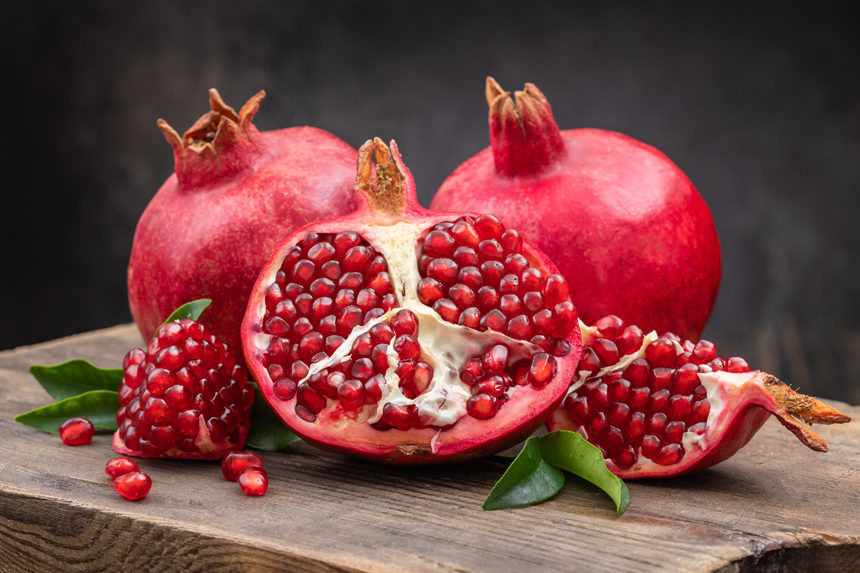Managing editor and logophile Andy Hollandbeck reveals the sometimes surprising roots of common English words and phrases. Remember: Etymology tells us where a word comes from, but not what it means today.
I remember the first time I tried a pomegranate. Mind you, it’s not the flavor I remember, but the experience.
I was a teenager, still living at home with my folks. One weekend my mother came home from doing the regular grocery run, but she had something new in her bag: a round, ruby-colored pomegranate. She had never tried pomegranate before — none of us had — and had decided that afternoon that it was as good a time as any to change that.
The only things we really knew about pomegranates were that the name is difficult to spell and that we were supposed to eat the seeds, not the bitter flesh. That meant that the first order of business was separating the seeds from the fruit. And that’s where the fun began.
If you look at the image of the pomegranate at the top of this article, you’ll see that it looks like a fruit full of red seeds. That’s not exactly right: What they’re full of is explosive little seed-sized bags of red dye.
Thanks to the Internet, today you have quick and easy access to a plethora of videos about how to safely and speedily remove pomegranate seeds. But that day in our kitchen, YouTube was more than a decade away, and we didn’t know what we were doing. So when we tore into that fruit (thankfully, over the sink), our eager thumbs sank into those seeds and popped them, sending sprays of red juice in all directions.
In the end, we did get our bowlful of pomegranate seeds to try, but with our stained fingers and splashes of red on our shirts, we looked like we had just tried to perform emergency appendectomies on ourselves.
Now I’m in my 40s, and pomegranate is still a difficult word to spell. The way I pronounce it, it sounds like it should start with a “pomma-,” or maybe something related to the pommel of a pommel horse, and it should end with granite. (The seeds aren’t that hard.)
The problem is that the pomegranate doesn’t really get its own name. When it came time to name this shrub-grown delicacy, they called it an apple.
Apple (æppel in Old English) was for a long time the word used for practically any fruit except berries. Everything can’t be just an apple, so to differentiate between fruits, another noun would be tacked on. For example, a date was called a fingeræppla — a “finger-apple.” In one Old English text, a cucumber was called an eorþaeppla — an “earth-apple.”
And it wasn’t only in English that apple was so generic. If you’ve ever taken a French class, you’ve probably encountered a different kind of “earth-apple” before: Pomme de terre, “apple of the earth,” is what French speakers call a potato. Which brings us back to pomegranate, which, as it happens, came into English from French.
In Medieval Latin, the pomegranate was called pomum granatum. Granatum means “having grains” (it and the word grain both come from granum) or, in this case, “having seeds.” A pomum granatum was an “apple with many seeds.”
This became the Old French pome grenate which, after a little 13th-century transposition, became the English poumgarnet. But by the early 15th century, the spelling was restored to pomegranate.
Bonus etymology: The Old French pome grenate became simply grenate (the seeds were the most important part, after all), which, in Modern French, softened to grenade. In the 16th century, weapon-makers came up with a hand-thrown explosive device, which sent shrapnel in all directions. Either because of the fruit-like shape or the “seeds” of shrapnel hiding inside, it, too, came to be called a grenade.
Which, when I think about the teenage me covered in pomegranate juice, seems about right.
Become a Saturday Evening Post member and enjoy unlimited access. Subscribe now




Comments
Happy Thanksgiving, Andy! I’m heading off to mine in about 2 hours. Not sure what’s going to happen, just keepin’ my fingers crossed. I never knew any of the background of this is healthy fruit before, or eaten the seeds directly. The POM Wonderful juice is the closest I’ve gotten. Getting even more pricey. of course. (Love Green Goodness by Bolthouse Farms a lot, too)
The strong connection to the word ‘apple’ kind of surprised me, as it’s a specific fruit with several varieties. At one time very generic. Interesting Medieval Latin to Old French roots. The latter leading to the word ‘grenade’, which is appropriate considering their exploding similarities.
I’m figuring you’ll never come near the war grenade, but also steer clear of the granate while working with one unless you’re wearing an old t-shirt that doesn’t matter. Always good to have a couple of those on hand.